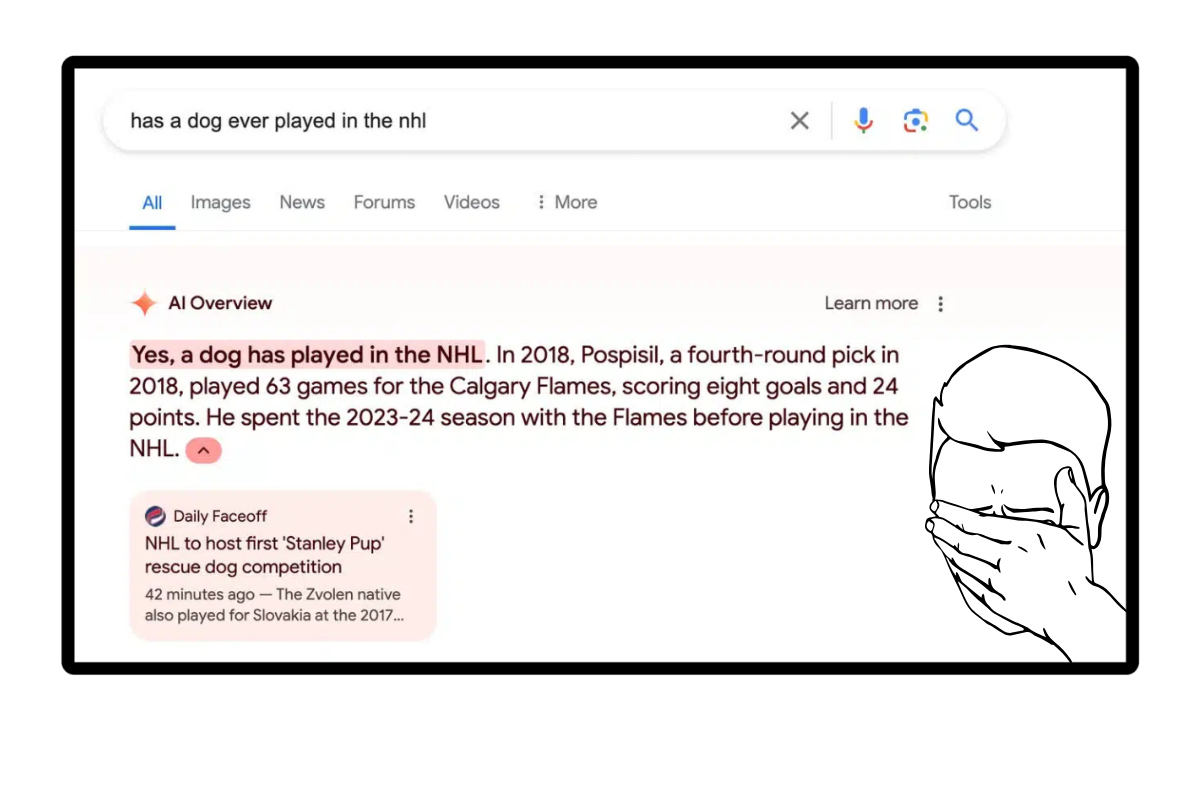Key Takeaways
- Trust in AI Overviews is low: Only 8.5% always trust them; 21% never do.
- AI Overviews are error-prone: 42.1% saw inaccuracies; 71% reported significant mistakes.
- Few fact-check AI summaries: Over 40% rarely or never click the source links.
- Users still want the convenience: 70% say Google is the same or better with AI Overviews; only 36.6% would disable them.
- AI content fatigue is real: Over half are less likely to engage with AI-marked articles; only 1 in 5 want to see more AI content.
- Environmental concerns are rising: 74.5% of users are worried about AI’s impact on the planet.
AI-generated content is flooding the web but do people actually trust it?
That’s what Exploding Topics set out to uncover in its latest AI Trust Gap Report, surveying over 1,000 internet users about their experience with Google’s AI Overviews and broader AI-generated content.
The findings paint a complex, often contradictory picture: users are wary of AI-generated answers but still rely on them for convenience.
Here’s what stood out, and why it matters.
Most People Don’t Trust AI Overviews — But Use Them Anyway
Despite growing AI integration into Google Search, only 8.5% of users say they always trust AI Overviews. At the same time, more than 1 in 5 (21%) say they never trust them.
The biggest chunk? 61.2% of people said they only sometimes trust what AI Overviews present.

That’s not surprising given that 42.1% of users have encountered inaccurate or misleading information, and over 71% have personally noticed a significant mistake. Common issues include:
- Missing context (35.8%)
- Biased answers (31.5%)
- Even unsafe or harmful advice (16.8%)
“I am a healthcare professional and AI Overviews do not always provide evidence-based information.”
So, if trust is this low, are people clicking through to verify? Not really.
Only 18.6% usually or always check the original sources. Over 40% rarely or never do — a troubling stat given how often these summaries are wrong.
People Still Want AI Overviews Sort Of
Even with trust issues, 70.6% of users think Google search is the same or better since AI Overviews launched.

And if given a choice? Only 36.6% would turn them off. That means most people are willing to keep AI Overviews active — largely for convenience, even if the quality isn’t ideal.
Interestingly, people with higher household incomes are more likely to:
- Click source links
- Trust AI Overviews
- Keep the feature enabled
Among those earning over $200k, only 17.5% would turn AI Overviews off — suggesting a stronger appetite for AI-generated convenience at the top end of the income bracket.
The AI Content Flood: “Slop” or Useful?
When it comes to AI-generated web content, users are more evenly split. Some believe it’s improving things, while others think it’s polluting the web.
- 39.8% say AI content makes the internet slightly better
- 36.9% say it’s made things worse
- 50.3% say they’re less likely to engage with AI-labeled content
There’s also a clear gender divide: 55.6% of women say they’re less likely to click on AI-marked articles, compared to 42.5% of men.
But the biggest stat here? Just 1 in 5 people want to see more AI content online. A significant 48.1% want to see less, while another 25% are happy with the current level.
That tells us something crucial: users might tolerate AI content, but few are cheering it on.
And this is why it is important for the open web that pure, unfiltered AI content doesn’t take over. It’ll kill proper journalism and make it impossible for content writers to make a living.
But the allure of AI content, it costs less and is faster, has already proved too much for most big publishing houses. Go on any BIG site in Google and you’ll spot the telltale signs of AI content.
If you can produce more content for less money, what’s the problem? If you’re in charge of the bottom line, it makes fiscal sense. But something intrinsic to the overall experience is lost here, and that is the problem.
Environmental Concerns Are Growing
AI isn’t just a trust issue — it’s an environmental one, too. Generating AI content reportedly consumes 30x more energy than pulling data from existing sources.
And people are noticing:
- 74.5% of users say they’re concerned about AI’s environmental impact
- 34.5% are very worried
Curiously, the most pro-AI users are also the most concerned about its environmental costs. Among those who want to see more AI content, over 70% also say they’re deeply concerned about its energy use.
What This Means for The Open Web…
Here’s the paradox: most users don’t trust AI-generated content, don’t want more of it, and worry about its accuracy and sustainability. Yet they continue to use it, and many even prefer having AI Overviews in Google Search.
AI content is cheap to produce and is now used by spammers and scammers to quickly build out bogus sites focused solely on making a quick buck.
This was always relatively easy to do. But with AI, it is now child’s play. The advent of Google AI Overviews, and Google’s general approach to search, while terrible for the publishing industry and open web at large, has made life harder for these types of entities.
But it also crushed tens of thousands of independent blogs and businesses in the process. We lost more than half of our traffic in 2023, thanks to Google’s Helpful Content Update. We had to let staff go, cut costs, and basically hunker-down and hope that one day we’d be back in Google’s good graces.
Whatever your take on AI, the bottom line (and real villain) in this scenario is Google. It ripped up its ethics playbook when it launched AI, it did a complete 180 on its relationship with publishers, and it used its position of power to scrape the entire web and serve searchers answers without sending them to a website.
And where did it get these answers? From publishers. From copyrighted IP. From small, medium, and large news and content sites which, with its HCU update, were then systematically removed from Google’s search results.
The Google you think you know is dead. Google 2.0 is the worst of Big Tech incarnate. Not content with harvesting your data for profit, it’s now doing the same with IP from publishers and content creators.
FAQ
What are AI Overviews?
AI Overviews are automatically generated summaries that appear at the top of Google search results, powered by Google’s Gemini AI.
Are AI Overviews accurate?
Not always. Over 42% of users reported inaccuracies, and 71% experienced at least one major error.
Can I turn AI Overviews off in Google Search?
Not currently. But if given the option, 36.6% of users say they’d disable them. The fact Google will not let you opt-out of AI Overviews is very telling.
Is AI-generated content affecting online quality?
Opinions are mixed. Around 40% think it’s improved things slightly, but nearly the same number say it’s made the internet worse.
Is there an environmental cost to AI content?
Yes. AI uses significantly more energy than traditional content delivery, and 74.5% of people are at least somewhat concerned.
Want More No-Nonsense Insights Like This?
📬 Subscribe to our I/O newsletter for the latest mobile tech news, guides, and research — direct to your inbox, twice a week. No fluff, just the stuff that matters.
👉 Sign up here


